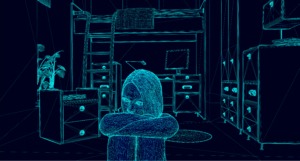Every month, the staff at the Ministry Centre participate in a learning session hosted by an expert volunteer. Topics in the past few months have ranged from working effectively from home to time management techniques. At the end of November, Chris Lindsay, Registered Social Worker, Counsellor and Psychotherapist, spoke with the Ministry Centre team about the impact COVID-19 is having on our mental health. The staff found the talk very helpful so we decided to share what Chris had to say here.
DOUBLE WHAMMY
COVID-19 has created a double whammy in terms of mental health. There is a lot of uncertainty right now because none of us know how this pandemic will affect us or when it will end. Uncertainty is rock fuel for anxiety. We are also grieving different kinds of loss including relational and interpersonal loss. God created us for connection, but we can’t connect the way we would like to right now. Human connection is on par with food and water in terms of importance, and these days we are all hungry and thirsty because we can’t connect as well. This combined with darker, long winter days is resulting in low mood and depression in some. When you put anxiety and depression together – that’s the double whammy.
When I talk about anxiety and depression, diagnosis exists on a continuum. Some people who are further along the continuum would benefit by meeting with their doctor or a therapist. Others who are lower on the continuum could implement some of the ideas I suggest here. I can’t tell you where we all are on the continuum but I read that the rates of clinical depression and anxiety are way up. I believe that none of us is at zero anxiety/depression these days. We are all on the continuum somewhere.

ANXIETY
Anxiety is actually a good thing. It’s a gift that God gave us. Think of anxiety as an alarm system. If you walk out onto the street without looking and realize that a bus is about to hit you, anxiety is good because it mobilizes the body and hopefully you dive out of the way. Where it becomes a problem for some of us is when there is no bus and yet we still feel elevated anxiety or our alarm system is going off all the time.
I don’t think Jesus was really kidding when he said, “And which of you by being anxious can add a single hour to his span of life?” – Luke 12:25
Worrying is not helpful. Everyone knows this yet, it’s hard to just say, “Okay, I’ll stop! No more worrying for me.” It’s really hard to stop because worrying is connected to our alarm system which is designed to not be ignored. So what can you do? To begin, we need to
recognize that worrying doesn’t in fact help things. Here’s an example: We might say to ourselves, “Worrying helps me remember things.” No, it doesn’t. Worrying is a distraction. Putting a reminder in your phone or writing things down will help you remember. Worrying doesn’t. Another example: “Worrying shows that I care.” No, caring shows that you care not worrying. Recognizing that worrying doesn’t help things is a good first step to managing your anxiety.
DEPRESSION
Some of the lies that low mood or depression tells us are that “I’m worthless” (which goes against the message of Jesus), “I’m broken, and I don’t have any energy.” All of these undermine motivation, but most of us have it backwards when it comes to motivation. We think, “I’ve got to have the feeling of motivation then I’ll do something.”
According to the smart people who research this stuff that is backwards. Motivation comes after action. If you want to get motivated then do something. When I first heard this I didn’t like it. It’s an unpleasant thought, but I think it’s true. If you start to do things you get more motivated. It doesn’t matter a whole lot what you do as long as you do something. It could be as simple as washing the dishes. Then, that may progress into something else.

BULLIES
When I work with kids I talk about anxiety and depression as bullies because kids understand that idea. One thing that bullies do is lie to us and try to trick us. Anxiety and depression are both bullies. They are out to lie and trick. I once saw a bumper sticker that read, “Don’t believe everything you think.”
There are untruths that fuel anxiety and depression. Our thinking can really fuel these feelings. Part of our task is to notice what we are thinking and question it. Is there a problem? Are we being passive. Right now we are all locked down to varying degrees which is affecting our relationships. As an introvert, I could be passive about this, but I know this isn’t the best choice for me or my family. We’ve got to intentionally try to connect and if the only way to do that is through Zoom or other media platforms (which we are all getting tired of) it’s better than not connecting. I have to tune out the bully who tells me not to bother.
WHAT CAN WE DO?
It is helpful to intentionally remind our brains and nervous systems what it feels like not to be anxious or depressed. We can do that by getting involved in things that make us feel good or by remembering situations in which we felt calm, loved, or safe. These can help combat anxious, depressed feelings.
Exercise is helpful for so many things including mood and mental health. Even better if you can exercise out in nature. Even twenty minutes a day can impact your mood.
Light therapy is also helpful. NASA discovered that it is the blue light in the light spectrum that stimulates the brain. For about $50 you can buy a blue happy light. Use it early in the morning, when it is still dark outside, for about twenty minutes to help improve your mood and energy level.
Chris Lindsay, M.Ed., RSW
www.chrislindsaycounselling.com




